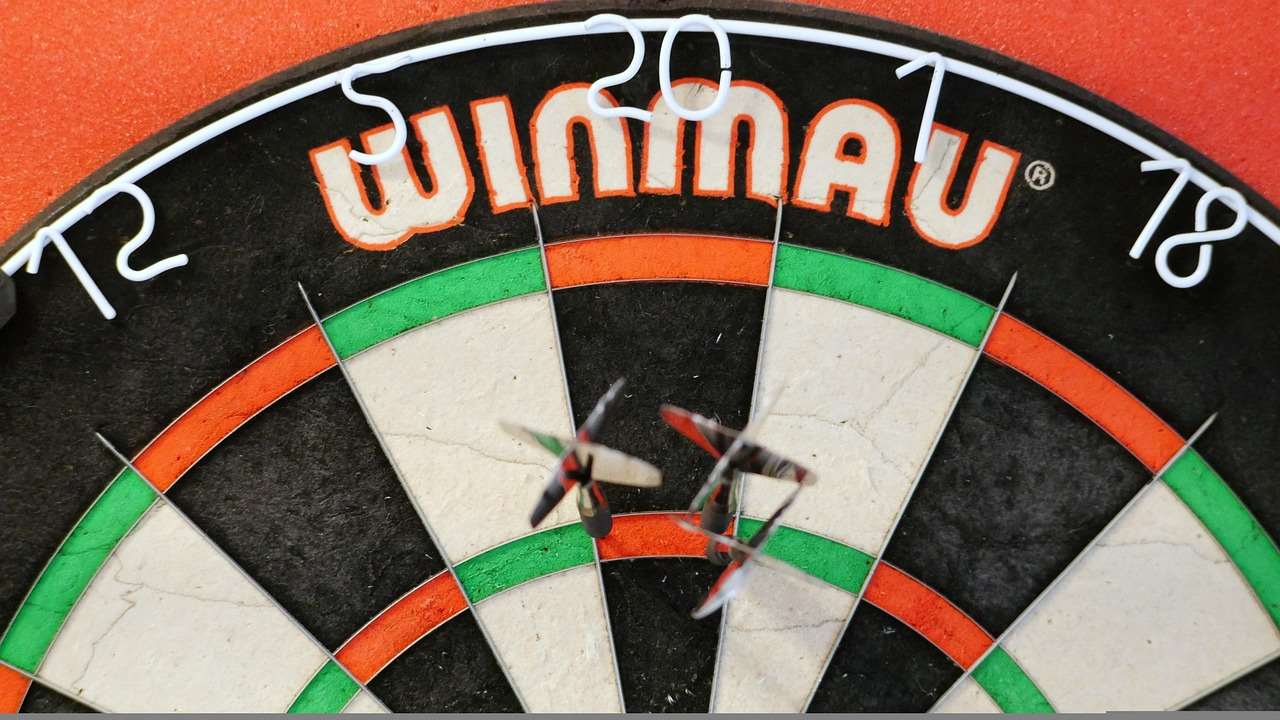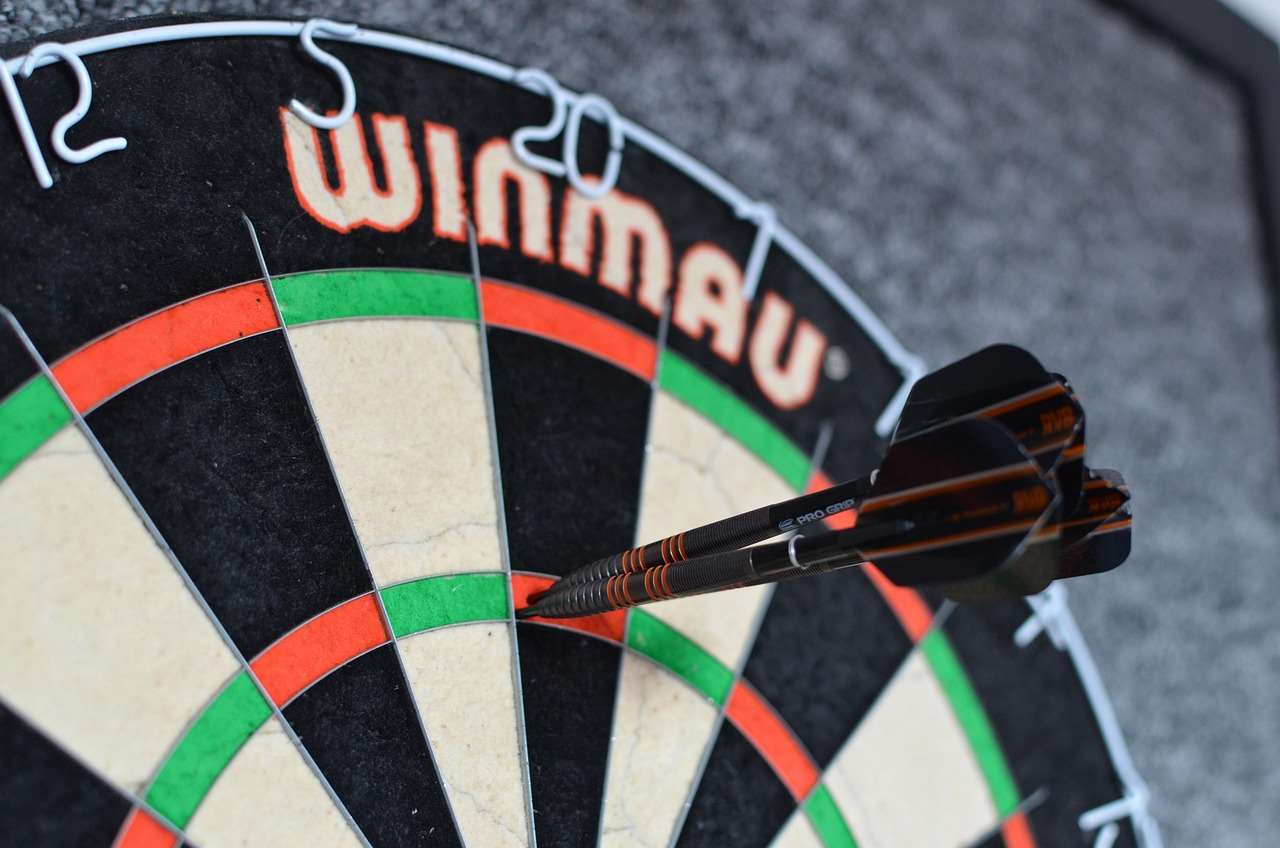Ready to elevate your game? Mastering target steel tip darts begins with understanding the equipment and techniques that professional players use. This article will guide you through everything from choosing the right darts to perfecting your throwing stance, helping you improve your accuracy and consistency on the oche.
⚠️ Still Using Pen & Paper (or a Chalkboard)?! ⚠️
Step into the future! The Dart Counter App handles all the scoring, suggests checkouts, and tracks your stats automatically. It's easier than you think!
Try the Smart Dart Counter App FREE!Ready for an upgrade? Click above!
Choosing the Right Target Steel Tip Darts
Selecting the perfect set of target steel tip darts can feel overwhelming with so many options available. Here’s a breakdown of the key considerations:
Weight
Dart weight is measured in grams. Heavier darts (24-26g) are generally favoured by beginners as they tend to fly straighter and are less affected by slight inconsistencies in your throw. Lighter darts (20-23g) require more precision but can offer greater control once mastered. Experiment to find what feels most comfortable and allows for consistent results.
Barrel Material
The barrel is the main body of the dart and is usually made of brass, nickel-silver, or tungsten. Tungsten darts are more expensive but offer a slimmer profile for the same weight, allowing for tighter groupings on the dartboard. Brass darts are the most affordable option, while nickel-silver darts fall in between in terms of price and performance.

Barrel Grip
The grip of your dart barrel influences how you hold and release it. Common grip styles include ringed, knurled, smooth, and scalloped. A more aggressive grip provides better control, especially for players with sweaty hands. Smooth barrels are ideal for those who prefer a lighter touch. Trying different grip styles is crucial to discovering what feels most natural and secure.
Shafts and Flights
Shafts connect the barrel to the flight and are available in various lengths and materials, such as nylon, aluminum, and carbon fiber. Shorter shafts generally result in a more direct flight path, while longer shafts offer greater stability. Flights, made of plastic or nylon, affect the dart’s aerodynamics. Smaller flights are typically used with heavier darts and vice versa. Regularly replacing worn-out shafts and flights ensures optimal performance. Remember to check target darts rove for some shaft and flight inspiration!
Understanding Dartboard Setup
Properly setting up your dartboard is essential for fair play and accurate scoring. Adhering to official regulations ensures a consistent and enjoyable experience.
Dartboard Height
The official height of the dartboard is 5 feet 8 inches (1.73 meters) from the floor to the center of the bullseye. Accurate measurement is key; even slight variations can impact your throw.
Throwing Distance (Oche)
The throwing distance, known as the oche, is 7 feet 9 1/4 inches (2.37 meters) from the face of the dartboard. Ensure the oche is clearly marked and that players stand behind it when throwing. It’s also a good idea to check which dartboard to learn about mounting the dartboard correctly.

Lighting
Adequate lighting is crucial for visibility and prevents eye strain. Position a light source above and slightly in front of the dartboard to eliminate shadows. Dedicated dartboard lighting systems are available for optimal illumination. Good lighting can significantly improve your accuracy, especially during extended practice sessions.
Perfecting Your Throwing Technique
Consistent throwing technique is the foundation of successful dart playing. Mastering the fundamentals is vital for improving your accuracy and reducing inconsistencies.
Stance
Your stance should be comfortable and stable. Most players stand with one foot placed firmly on the oche, angled towards the dartboard. Experiment with different stances to find what feels most balanced and allows for a natural throwing motion. Avoid swaying or shifting your weight during your throw.
Grip
Hold the dart firmly but not too tightly. A relaxed grip allows for a smoother release. Experiment with different grip positions to find what feels most comfortable and provides the best control. Avoid gripping the dart too far back or too far forward. The key is consistency.
Arm Motion
Your arm motion should be smooth and controlled, originating from the elbow. Keep your upper arm relatively still and focus on the forearm movement. Avoid jerking or snapping your wrist, as this can lead to inconsistent throws. Practice your arm motion in front of a mirror to identify and correct any flaws.
Release
Release the dart smoothly at the highest point of your throw. Follow through with your arm motion towards the target. A consistent release point is crucial for accuracy. Practice releasing the dart at the same point every time, and avoid snatching the dart back after release.

Practice Drills for Improved Accuracy
Consistent practice is essential for improving your dart game. Incorporate these drills into your routine to enhance your accuracy and consistency. Remember to check App to score darts (https://dartcounterapp.com/) for your practice games!
Bullseye Challenge
Focus solely on hitting the bullseye. Throw a series of darts and track your success rate. Gradually increase the number of consecutive bullseyes you aim for. This drill improves your focus and accuracy. Try setting daily or weekly goals to stay motivated.
Double Practice
Target specific doubles on the dartboard. Practice hitting doubles 20, 16, and 8 to improve your finishing skills. This drill is particularly important for competitive play. Focus on consistent release and aiming. Learn about dart counter how to use and use it to score your practice games.
Treble 20 (T20) Training
Aim for the treble 20 (T20) segment consistently. This is a crucial area for high scoring. Practice hitting T20 repeatedly to improve your overall game. Combine this drill with double practice for a well-rounded training session. Consider using target steel tip darts specifically designed for optimal T20 performance.
Advanced Techniques and Strategies
Once you’ve mastered the fundamentals, you can explore advanced techniques and strategies to further elevate your game.
Grouping
Grouping refers to the proximity of your darts to each other. Tight groupings indicate consistent throwing technique, even if you’re not hitting your intended target. Focus on improving your groupings by refining your stance, grip, and release. Consistent groupings allow for easier adjustments and corrections.

Mental Game
Dart throwing is as much a mental game as it is a physical one. Maintaining focus and composure under pressure is crucial. Develop mental strategies for overcoming nerves and staying positive. Visualize successful throws and practice mindfulness techniques to enhance your concentration. Also consider following darts results european tour to see how the pros handle the pressure.
Checkout Strategies
Mastering checkout strategies is essential for winning games. Learn common checkout combinations and practice them regularly. Develop a plan for each leg of the game, considering your scoring potential and your opponent’s position. Effective checkout strategies can give you a significant advantage.
Maintaining Your Target Steel Tip Darts
Proper maintenance ensures your target steel tip darts perform optimally and last longer. Regular cleaning and care are essential.
Cleaning
Clean your dart barrels regularly with a soft cloth or brush to remove dirt and grime. Use a mild detergent if necessary. Avoid using abrasive cleaners, as they can damage the barrel’s finish. Clean darts provide a better grip and prevent slippage.
Sharpening
Sharpen your dart points regularly to ensure they stick properly in the dartboard. Use a dart sharpener specifically designed for steel tip darts. Dull points can cause bounce-outs and damage your dartboard.
Storage
Store your darts in a protective case when not in use to prevent damage. A good case will protect your darts from bending, scratching, and other forms of wear and tear. Proper storage extends the lifespan of your darts and maintains their performance. Consider getting dartcounter google to track your maintenance schedule.

Conclusion
Mastering target steel tip darts requires a combination of the right equipment, solid technique, consistent practice, and a strong mental game. By following the tips and strategies outlined in this article, you can significantly improve your accuracy, consistency, and overall performance on the oche. Invest in quality darts, dedicate time to practice, and remember to enjoy the process. Now, grab your target steel tip darts and start throwing!
Hi, I’m Dieter, and I created Dartcounter (Dartcounterapp.com). My motivation wasn’t being a darts expert – quite the opposite! When I first started playing, I loved the game but found keeping accurate scores and tracking stats difficult and distracting.
I figured I couldn’t be the only one struggling with this. So, I decided to build a solution: an easy-to-use application that everyone, no matter their experience level, could use to manage scoring effortlessly.
My goal for Dartcounter was simple: let the app handle the numbers – the scoring, the averages, the stats, even checkout suggestions – so players could focus purely on their throw and enjoying the game. It began as a way to solve my own beginner’s problem, and I’m thrilled it has grown into a helpful tool for the wider darts community.